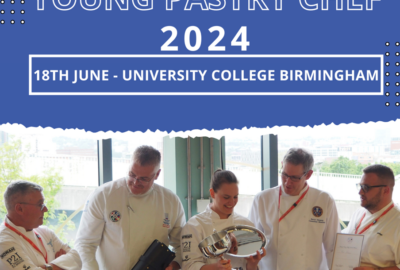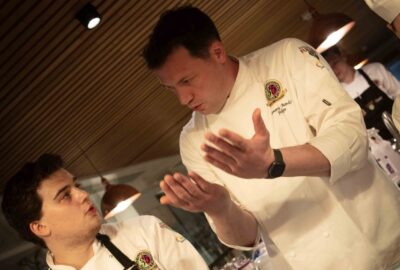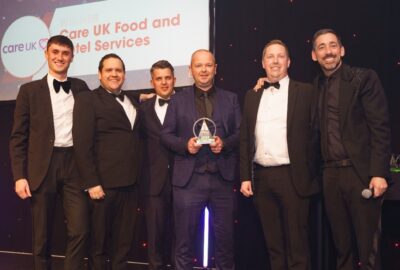Caterers are being urged to ‘do their bit’ in the global battle against plastic pollution. Sir David Attenborough recently called for the world to act on plastic, after witnessing its impacts on marine life during the filming of his latest TV series Blue Planet II.
“The growing pressure on companies, particularly in the retail, food and beverage industries to reduce the consumption of single use plastic has quite rightly prompted the uptake of exciting initiatives and schemes to battle the prominent issue,” explains Ian Motagalli, of Clearwater Technology. A new national campaign led by Water UK, for example, will allow people to refill water bottles for free by creating a national network of high street retailers, coffee shops, businesses and local authorities.
WRAP is also leading an ambitious UK initiative focusing on plastic packaging with the aim of eliminating unnecessary and problematic single-use plastic packaging, and ensuring all plastic packaging is reusable, recyclable or compostable. Marcus Gover, CEO, WRAP, said: “We will bring together every ‘body, business and organisation’ involved in the life-cycle of plastics to make the move from a throw away culture to one where resources are used over and over again.”
- Over 35 million plastic bottles are used every day in the UK. Of these, 16 million are not recycled
- It takes 75% energy to make a plastic bottle from recycled plastic compared with using virgin materials
- If a year’s worth of the UK’s un-recycled plastic bottles were placed end to end, they’d reach around the world 31 times, covering just over 780,000 miles
- The recycling rate for plastic bottles has increased dramatically from just 5% in 2000 to 58% in 2016
The last straw Newcastle-based hospitality operator Fresh Element has strengthened its stance on sustainability by banning plastic straws and stirrers in its venues. The company hopes to stop an estimated 50,000 straws and stirrers going into landfill from its three venues each year. Its initiative reinforces the ‘Refuse a Straw’ campaign that urges bars and restaurants to stop handing out straws with every drink. Single use plastic such as straws, end up in the sea each year, killing marine life and damaging ecosystems. The straws, which are thought to take up to 200 years to decompose, are one of the most common problems. Peter Hunt, co-founder of Fresh Element, said: “One of the problems facing the catering industry has always been wastage. Sustainability runs through everything we do, so it made sense to look at how we could reduce the waste of things like straws.”
Inspire customers to get drastic with plastic Try a price incentive scheme for customers who use reusable coffee cups. Or you could go a step further and charge extra for disposable cups – something being trialled by Starbucks and Oxford Brookes University among others. Join the campaign (www.refill.org.uk) – offering customers free water refills. For more information about the Sustainable Restaurant Association visit https://thesra.org.
Master the three Rs Reduce Reuse Recycle – in that order. So, the best place to start is with those single-use plastic disposables that don’t pass the necessary test. Pub groups like Wetherspoons and All Bar One have stopped automatically popping a straw in drinks and, when customers do request one, have moved to a more sustainable PLA or paper option.
Tailor make your own plastic solution A great place for caterers to start is monitoring and measuring what plastic you’re using so you understand what waste you are generating, advises Andrew Stephen, chief executive of the Sustainable Restaurant Association. “Then assess the type of products you’re using most of and check with your waste contractor what they can and can’t accept before diving into a big decision on recyclable, biodegradable or compostable alternatives.”
Get your back of house in order Provide staff with reusable coffee mugs and water bottles. One major London hotel worked out its 300+ team was getting through 1,000 plastic cups a day – more than 300,000 a year. A small investment in £1.50 reusable thermos cups more than outweighed the £15,000 savings, including the price of collection of the used plastic ones. Treat this as the first session in a simple staff engagement and training process.
Case study Country Range Group customer Griff Holland is the co-owner of Friska, a chain of healthy fast food restaurants in Bristol, Luton and Manchester, and a member of the Sustainable Restaurant Association. His company is trying desperately to ‘do the right thing’ in terms of waste management, but coming up against several barriers. “Being a responsible business underpins our business ethos and feelgood food strapline. It’s about going beyond look and taste and looking at provenance, making sure the meat you serve is responsibly reared and serving speciality coffee sourced from farms you know and trust. QSR venues are, by their nature, convenience-led but we do have a commitment to being responsible in our approach to disposables and the waste we create. “We launched FSC (Forest Stewardship Council) certified wooden cutlery but had lots of complaints because of the way it feels in your mouth. We then moved over to Bio Plastics but these fell short on two points. Firstly they are not as robust as normal plastic and are more difficult to cut with. Now I can deal with customers having to push harder on a Bio knife, however UK waste streams are so uncoordinated and complicated that, if you put Bio Plastic cutlery in with food waste, they biodegrade at different rates, so they end up being removed and incinerated! At least if things look like plastic you can make sure they are recycled. There’s just no joined up thinking at government level. “It’s a similar situation with ‘Bio’ paper cups. You need to have 10 pallet loads to compost them and that requires a country-wide coordination strategy. “We have multiple recycling bins in store for our customers as well as in the kitchen to separate waste. We also use wooden rather than plastic stirrers, and offer a 30p discount for customers who bring a keep cup, even though it only costs 7p for a disposable cup and lid, so we’re losing money. We encourage the use of ‘keep cups’ but, again, they’re a nice idea but a nightmare for baristas when it’s busy trying to match people to their cups! “We know waste is a problem and at the moment we feel we are doing the ‘least bad’ and more authentic thing however we would fully support a proper government review and policy change around how waste is managed in the UK.”


